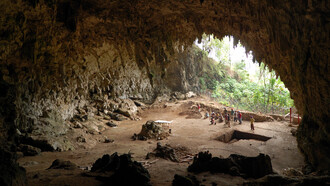Jacob Vilato is an artist with a philosophy that sets him apart from the pretentiousness and elitism often associated with the art world. His vision is to make art accessible, relatable, and free from snobbery, allowing everyone to appreciate and connect with his creations.
In a candid conversation, Vilato shares his insights on various aspects of his artistic journey, revealing a deep commitment to connecting with people through his work. His trademark style is described as "figurative, simple, humble, and human." He wants his art to resonate with a wide audience, believing that overly complicated pieces only serve to alienate viewers.
"I don't like snobby art," Vilato declares. "I want everybody to be able to enjoy it. It's about connecting with people and sharing ideas." He emphasizes the importance of finding the right angle to make art understandable and relatable, often employing humour to break down barriers and invite viewers into his creative world.
Vilato's approach to explaining art to a 10-year-old student is a prime example of his inclusive philosophy. He advocates for discussing pieces in a way that avoids intimidation or a sense of superiority. "Art is not something that happens in a moment," he explains. "It's something that keeps evolving. You can see a piece now, and you probably won't understand it the same way in, say, 10 years."
When asked about his creative process, Vilato admits to a lack of complete understanding, describing it as a "magic" or "miracle" that unfolds through persistent effort and commitment. He acknowledges the presence of perfection complexes and moments of self-doubt, but ultimately, it is the act of consistently showing up and working through these challenges that allows the creative flow to emerge.
"If you keep insisting, it works," Vilato says. "I don't know why. And the more you work on that, the more it flows." He likens this process to a spiritual journey, a purification of insecurities and distress before entering the "creative tunnel."
Vilato's philosophy extends beyond his artistic practice; it is a way of life that challenges the self-imposed barriers that often prevent individuals from fully expressing themselves. He encourages breaking free from societal expectations and conformity biases, which he believes can stifle creativity and personal growth.
"People are afraid of falling down because they fear being mocked by parents, friends, and society. They fear being misfits," Vilato explains. "It's unfair. You don't need to fit that much. It's a self-imposed barrier. It's killing you. It's killing some of the ideas you might have."
In Vilato's world, art is a vehicle for empathy, understanding, and human connection. He sees his role not as a superior being but as a fellow human being, sharing his experiences and perspectives through his creations. "I don't want to be seen as an artist, as a superior human being," he asserts. "I am not special. You can see my art with humour. You can say if you don't like it. I hope I can be approachable. We can discuss my art."
Vilato's artistic journey has not been without its challenges, but he embraces the ups and downs as part of the creative process. His resilience and commitment to his craft have allowed him to weather the toughest chapters of his life, emerging with a deeper appreciation for the evolution and growth that art can foster.
As for his most coveted masterpiece, Vilato would gift it freely to someone who embodies the spirit of appreciation and connection that he values so deeply. In his eyes, art is not a commodity to be hoarded but a gift to be shared and experienced by all.
With his approachable demeanour and inclusive philosophy, Jacob Vilato stands as a beacon for artists and art enthusiasts alike, reminding us that true art transcends boundaries and speaks to the universal human experience.















